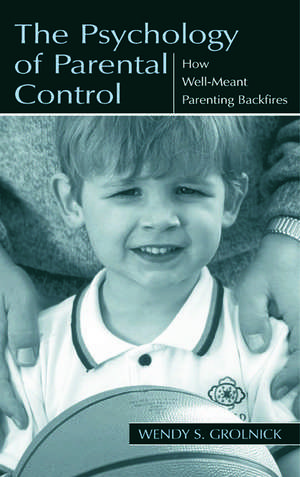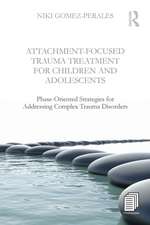The Psychology of Parental Control: How Well-meant Parenting Backfires
Autor Wendy S. Grolnicken Limba Engleză Hardback – aug 2002
With controversy in the literature about parental control and attention in the media on the ways in which parents step over the control line (e.g., screaming on the soccer sidelines, pressuring children in academics), this book is especially timely. It provides an empathic view of how easily parents can become trapped in controlling styles by emphasizing performance and hooking their own self-esteem on children's performance. Examples of how this can happen in academic, sporting, and peer situations with their emphasis on competition and hierarchy are provided, as well as strategies for parenting in highly involved but autonomy supportive ways.
A highly readable yet research-based treatment of the topic of parental control, this book:
*explores the controversial topic of parental control; addresses controversy about the positive and negative effects of parental control; and disentangles various parenting concepts, such as involvement, structure, and control;
*illustrates how control can be overt, such as in the use of corporal punishment or covert, as in the use of controlling praise;
*provides evidence that control may produce compliance in children preventing them from initiating and taking responsibility for their own behavior;
*explores why parents are controlling with their children, including environmental and economic stresses and strains, characteristics of children that "pull" for control, and factors in parents' own psychologies that lead them to be "hooked" on children's performance; and
*provides examples of control in the areas of academics and sports--the hierarchical and competitive nature of these domains is seen as contributing to parents' tendencies to become controlling in these areas.
| Toate formatele și edițiile | Preț | Express |
|---|---|---|
| Paperback (1) | 242.33 lei 6-8 săpt. | |
| Taylor & Francis – aug 2002 | 242.33 lei 6-8 săpt. | |
| Hardback (1) | 761.01 lei 6-8 săpt. | |
| Taylor & Francis – aug 2002 | 761.01 lei 6-8 săpt. |
Preț: 761.01 lei
Preț vechi: 1028.09 lei
-26% Nou
Puncte Express: 1142
Preț estimativ în valută:
145.66€ • 151.81$ • 121.25£
145.66€ • 151.81$ • 121.25£
Carte tipărită la comandă
Livrare economică 04-18 ianuarie 25
Preluare comenzi: 021 569.72.76
Specificații
ISBN-13: 9780805835403
ISBN-10: 0805835407
Pagini: 196
Dimensiuni: 152 x 229 x 18 mm
Greutate: 0.52 kg
Ediția:1
Editura: Taylor & Francis
Colecția Psychology Press
Locul publicării:Oxford, United Kingdom
ISBN-10: 0805835407
Pagini: 196
Dimensiuni: 152 x 229 x 18 mm
Greutate: 0.52 kg
Ediția:1
Editura: Taylor & Francis
Colecția Psychology Press
Locul publicării:Oxford, United Kingdom
Public țintă
ProfessionalCuprins
Contents: Introduction. The Concept of Control. Fulfilling Children's Needs: The Self-Determination View. The Complexity of Control: Disentangling Parenting Dimensions. Overt and Covert Control. Differentiating the Effects of Control: Compliance Versus Internalization. Control in Context. What Makes Parents Controlling: Pressure From Above and Below. What Makes Parents Controlling: Pressure From Within. Control and Academics. Control and Sports. Conclusions.
Recenzii
"Grolnick demonstrates incredible skill in explaining the results of scientific studies of parenting in a manner that will be relevant to all readers, be they students, scholars, clinicians, or parents. Highly recommended."
—CHOICE
"The book examines the concept of parental control and discusses what research has found about the effects of control on children's development. The book also discusses specific ways parents exert control, examines the effects of control on various goals parents have for their children, examines autonomy support, and explores how parents can implement autonomy-supportive parenting in the realms of school, sports, and social activities."
—ERIC Clearinghouse on Elementary and Early Childhood Education
"It is a clear, well-written and practical text that would be useful for academic courses in psychology and teacher education and to parents as well....there is much in this book to recommend. The discussion of cultural and ethnic differences in the perceptions of parental behavior....the discussion of parental ego involvement, particularly as it relates to the child's intelligence and school success, could be enlarged into a book unto itself....the discussion of informational vs. controlling praise is as interesting as it is counter-intuitive. This book is recommended with the hope that it gets a wide reading."
—Metapsychology
—CHOICE
"The book examines the concept of parental control and discusses what research has found about the effects of control on children's development. The book also discusses specific ways parents exert control, examines the effects of control on various goals parents have for their children, examines autonomy support, and explores how parents can implement autonomy-supportive parenting in the realms of school, sports, and social activities."
—ERIC Clearinghouse on Elementary and Early Childhood Education
"It is a clear, well-written and practical text that would be useful for academic courses in psychology and teacher education and to parents as well....there is much in this book to recommend. The discussion of cultural and ethnic differences in the perceptions of parental behavior....the discussion of parental ego involvement, particularly as it relates to the child's intelligence and school success, could be enlarged into a book unto itself....the discussion of informational vs. controlling praise is as interesting as it is counter-intuitive. This book is recommended with the hope that it gets a wide reading."
—Metapsychology





















